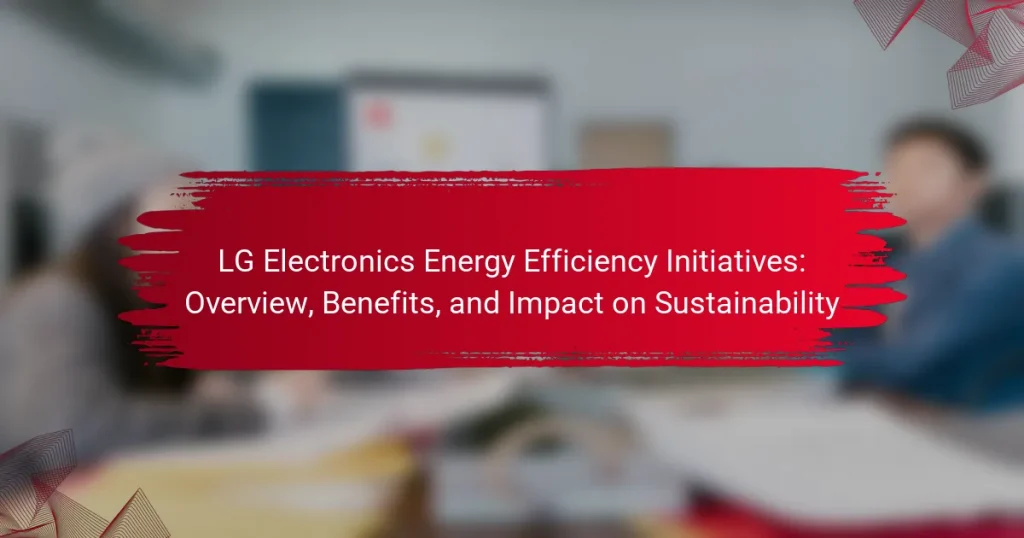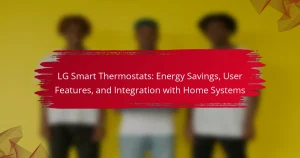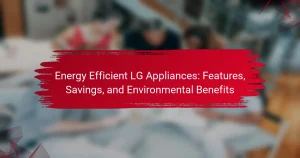LG Electronics focuses on energy efficiency initiatives designed to reduce energy consumption and promote sustainability. The company develops energy-efficient appliances, including refrigerators, air conditioners, and washing machines, which often achieve ENERGY STAR certification. By implementing advanced technologies such as inverter compressors and LED lighting, LG enhances energy performance while lowering greenhouse gas emissions and electricity costs for consumers. The company also emphasizes the use of renewable energy in manufacturing and plans to invest in smart appliances and AI-driven solutions to further optimize energy use. These efforts align with global sustainability goals and demonstrate LG’s commitment to reducing its carbon footprint and supporting a circular economy.
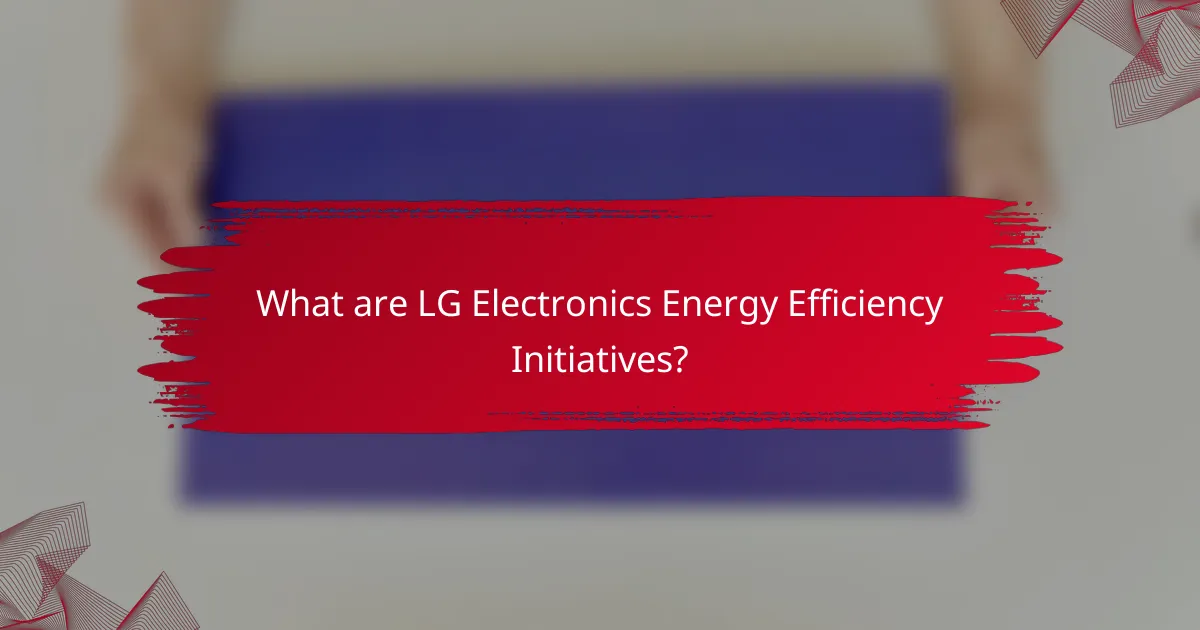
What are LG Electronics Energy Efficiency Initiatives?
LG Electronics implements various energy efficiency initiatives aimed at reducing energy consumption. These initiatives include the development of energy-efficient appliances and technologies. LG focuses on products such as refrigerators, air conditioners, and washing machines that meet strict energy standards. The company also invests in smart home technology to optimize energy use. Additionally, LG participates in global sustainability programs to promote energy conservation. Their commitment is reflected in achieving ENERGY STAR certifications for many products. LG’s initiatives contribute to significant reductions in greenhouse gas emissions. These efforts align with global goals for sustainable development and energy efficiency.
How do LG Electronics approach energy efficiency?
LG Electronics approaches energy efficiency through innovative technologies and sustainable practices. The company implements energy-efficient designs in its products, such as appliances and electronics. LG utilizes inverter technology to optimize energy consumption in devices like air conditioners and refrigerators. This technology adjusts power usage based on demand, reducing unnecessary energy waste.
Additionally, LG focuses on renewable energy initiatives. The company has committed to sourcing renewable energy for its global operations. This commitment includes investing in solar and wind energy projects. LG also participates in various energy efficiency certifications, such as ENERGY STAR, to validate its efforts.
These initiatives contribute to LG’s goal of reducing greenhouse gas emissions. The company aims for a 50% reduction in emissions by 2030 compared to 2017 levels. Overall, LG Electronics prioritizes energy efficiency as a core aspect of its sustainability strategy.
What strategies are employed by LG Electronics for energy efficiency?
LG Electronics employs several strategies for energy efficiency. They focus on developing energy-efficient products, such as appliances and electronics with high Energy Star ratings. The company utilizes advanced technologies like inverter compressors in refrigerators and air conditioners. This technology optimizes energy use by adjusting the compressor speed based on demand. LG also implements smart home solutions that allow users to monitor and control energy consumption remotely.
Additionally, LG engages in sustainable manufacturing practices to reduce energy usage during production. The company aims to achieve carbon neutrality in its operations by 2030. LG’s commitment to energy efficiency is evidenced by its investment in renewable energy sources. These strategies collectively contribute to reducing overall energy consumption and promoting sustainability.
How does LG Electronics measure the success of its initiatives?
LG Electronics measures the success of its initiatives through key performance indicators (KPIs). These KPIs include energy savings achieved, reduction in greenhouse gas emissions, and customer satisfaction ratings. The company conducts regular assessments to evaluate these metrics. Data analytics tools are utilized to track progress over time. Additionally, LG compares its performance against industry benchmarks. This allows for a comprehensive understanding of initiative effectiveness. Reports are generated to communicate results to stakeholders. These practices ensure transparency and accountability in LG’s sustainability efforts.
What are the key benefits of LG Electronics Energy Efficiency Initiatives?
LG Electronics’ energy efficiency initiatives provide significant benefits that enhance sustainability. These initiatives reduce energy consumption, leading to lower utility costs for consumers. They also minimize greenhouse gas emissions, contributing to environmental protection. Additionally, LG’s focus on innovative technologies boosts product performance and longevity. This results in less waste and resource conservation. According to the U.S. Department of Energy, energy-efficient products can save consumers up to 30% on energy bills. Overall, LG’s efforts support both economic savings and environmental stewardship.
How do these initiatives impact consumer savings?
LG Electronics’ energy efficiency initiatives significantly impact consumer savings. These initiatives lower energy consumption in appliances, resulting in reduced utility bills. For example, energy-efficient refrigerators can save consumers up to $300 over their lifespan. Additionally, consumers benefit from government rebates and incentives for purchasing energy-efficient products. According to the U.S. Department of Energy, energy-efficient appliances can reduce energy use by 10-50%. This translates to substantial savings for households. Overall, these initiatives not only enhance sustainability but also provide financial relief to consumers.
What environmental benefits are associated with LG Electronics’ initiatives?
LG Electronics’ initiatives provide significant environmental benefits. These initiatives focus on reducing energy consumption in their products. For example, LG’s energy-efficient appliances can lower greenhouse gas emissions. According to the U.S. Department of Energy, energy-efficient appliances can reduce energy use by up to 50%. LG also emphasizes the use of sustainable materials in product design. This reduces waste and promotes recycling. Their commitment to renewable energy sources further decreases reliance on fossil fuels. LG’s initiatives contribute to a more sustainable future and enhance overall environmental health.
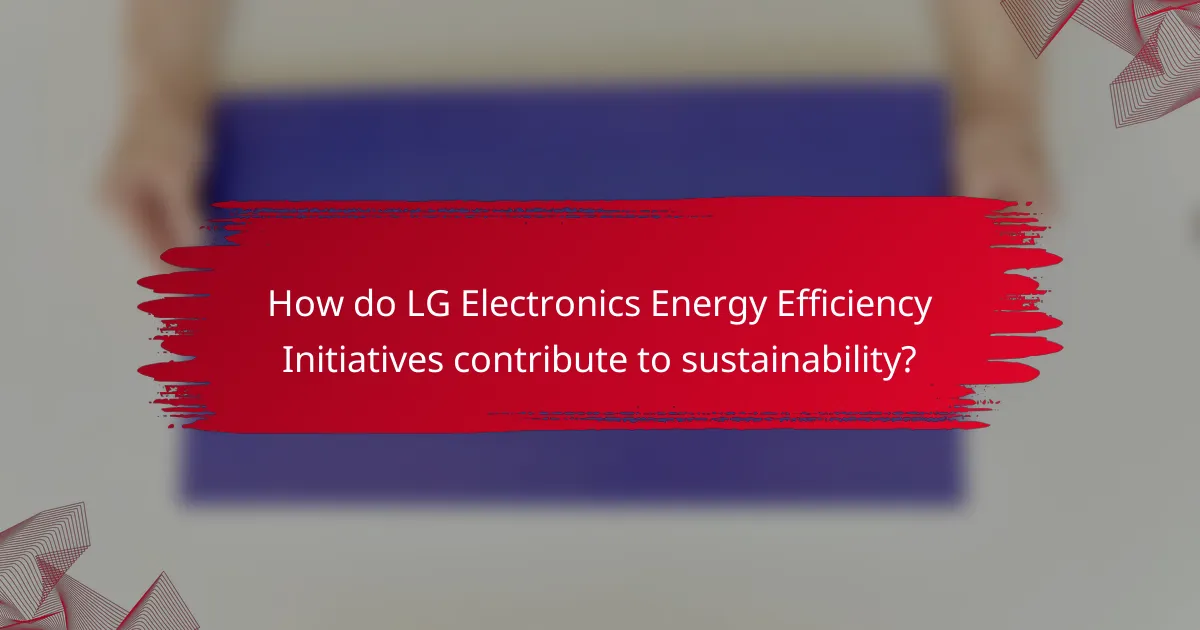
How do LG Electronics Energy Efficiency Initiatives contribute to sustainability?
LG Electronics’ energy efficiency initiatives significantly contribute to sustainability by reducing energy consumption and minimizing environmental impact. These initiatives include the development of energy-efficient appliances that meet or exceed regulatory standards. For instance, LG’s products often achieve Energy Star certification, indicating superior energy performance.
By implementing advanced technologies, such as inverter compressors and LED lighting, LG reduces the energy required for operation. This not only lowers greenhouse gas emissions but also decreases electricity costs for consumers.
In 2020, LG reported a 20% reduction in energy consumption across its product lines compared to 2017 levels. This achievement demonstrates a strong commitment to sustainability. Additionally, LG’s focus on renewable energy sources for manufacturing further enhances its sustainability profile.
These combined efforts illustrate how LG Electronics’ energy efficiency initiatives play a crucial role in promoting sustainable practices and reducing the carbon footprint.
What role does innovation play in LG Electronics’ sustainability efforts?
Innovation is central to LG Electronics’ sustainability efforts. It drives the development of energy-efficient technologies. For instance, LG has introduced appliances with advanced inverter technology. This technology reduces energy consumption significantly. Additionally, LG’s commitment to renewable energy sources is evident in its solar panel production. The company aims to achieve carbon neutrality by 2030. As part of this goal, LG invests in research and development for sustainable materials. These innovations contribute to reducing the environmental impact of their products. Overall, innovation enhances LG’s capability to meet sustainability targets effectively.
How does LG Electronics integrate renewable energy into its initiatives?
LG Electronics integrates renewable energy into its initiatives by committing to sustainable practices and reducing carbon emissions. The company has set a goal to achieve carbon neutrality in its global operations by 2030. It invests in solar energy projects and utilizes renewable energy sources for its manufacturing facilities. For instance, LG’s production plants in South Korea are increasingly powered by solar energy. Additionally, LG has implemented energy-efficient technologies in its products, promoting the use of renewable energy among consumers. This approach not only supports sustainability but also aligns with global efforts to combat climate change.
What partnerships does LG Electronics engage in to enhance sustainability?
LG Electronics engages in partnerships with various organizations to enhance sustainability. Notable collaborations include working with the United Nations Environment Programme. This partnership focuses on promoting sustainable practices globally. LG also collaborates with the Global e-Sustainability Initiative. This initiative aims to drive sustainable development in the electronics sector. Additionally, LG has partnered with various academic institutions for research on energy efficiency. These partnerships support innovation in sustainable technologies. LG’s involvement in these collaborations demonstrates its commitment to environmental responsibility.
How do LG Electronics Energy Efficiency Initiatives influence industry standards?
LG Electronics’ energy efficiency initiatives set benchmarks that influence industry standards. The company implements advanced technologies in its products, promoting higher energy efficiency. For instance, LG’s use of inverter technology in air conditioning systems reduces energy consumption significantly. This innovation encourages competitors to adopt similar technologies, raising overall industry standards. Furthermore, LG actively participates in energy efficiency programs and certifications, such as ENERGY STAR. These programs establish criteria that other manufacturers strive to meet. Additionally, LG’s commitment to sustainability influences regulatory policies, pushing for stricter energy efficiency regulations. This proactive approach positions LG as a leader in energy efficiency, shaping industry practices and consumer expectations.
What benchmarks does LG Electronics set for energy efficiency in the industry?
LG Electronics sets high benchmarks for energy efficiency in the industry through innovative technologies and sustainable practices. The company aims to achieve a 40% reduction in greenhouse gas emissions by 2030 compared to 2017 levels. LG has also committed to using 100% renewable energy in its operations by 2025. The Energy Star certification is a standard LG products frequently meet, ensuring they consume less energy than non-certified products. Additionally, LG’s Smart Inverter technology enhances energy efficiency in appliances, reducing energy consumption significantly. These benchmarks reflect LG’s commitment to sustainability and leadership in energy-efficient solutions.
How does LG Electronics’ commitment to energy efficiency inspire competitors?
LG Electronics’ commitment to energy efficiency sets a benchmark for competitors in the electronics industry. This commitment is evident through their innovative technologies that reduce energy consumption in appliances and electronics. For instance, LG has developed energy-efficient products like the Inverter Linear Compressor in refrigerators, which uses 32% less energy compared to traditional models. Such advancements not only enhance product performance but also promote sustainability. Competitors often look to LG’s initiatives as a model for their own energy efficiency strategies. By showcasing the economic benefits of energy savings, LG encourages rivals to invest in similar technologies. This competitive pressure can lead to industry-wide improvements in energy efficiency. Ultimately, LG’s leadership in this area drives a broader shift toward sustainable practices across the electronics sector.
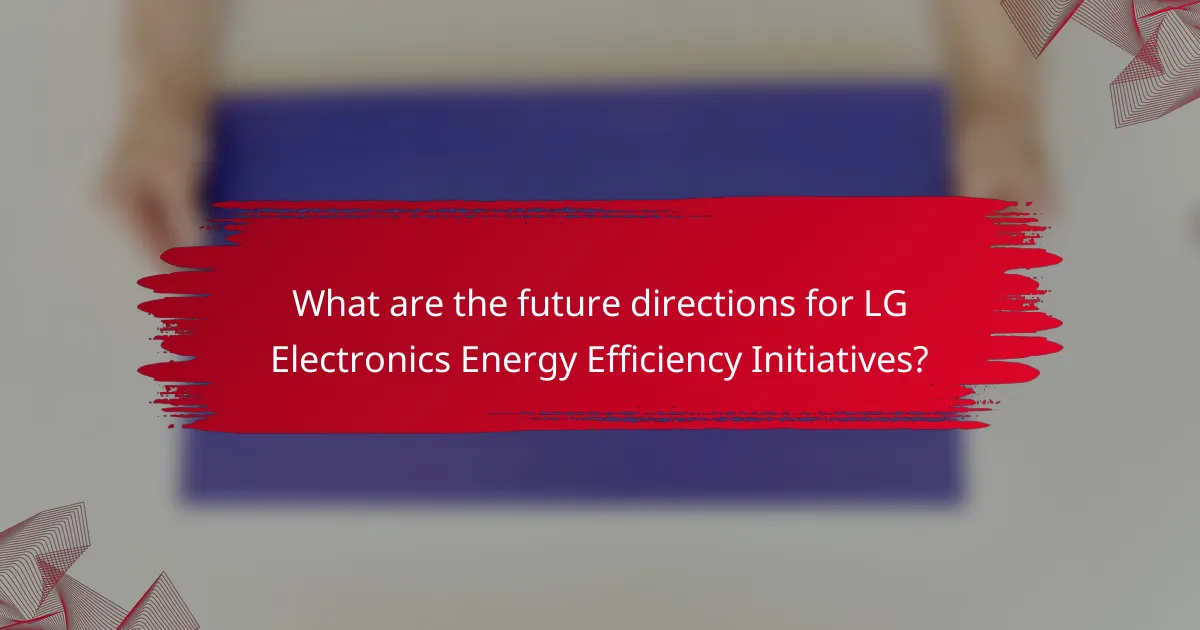
What are the future directions for LG Electronics Energy Efficiency Initiatives?
LG Electronics aims to enhance energy efficiency through advanced technologies and sustainable practices. Future initiatives will focus on smart appliances that optimize energy consumption. The company plans to invest in renewable energy sources for manufacturing. Additionally, LG will implement AI-driven solutions to monitor and reduce energy use in products. This approach aligns with global sustainability goals. LG’s commitment includes reducing greenhouse gas emissions by 50% by 2030. These strategies will support the transition to a circular economy. LG Electronics is dedicated to promoting energy-efficient innovations across its product lines.
What emerging technologies are being explored by LG Electronics?
LG Electronics is exploring various emerging technologies, including artificial intelligence, 5G connectivity, and advanced robotics. These technologies aim to enhance energy efficiency and sustainability in their products. AI is being integrated into appliances for smarter energy management. 5G connectivity facilitates real-time data exchange, improving operational efficiency. Advanced robotics are being developed for manufacturing processes to reduce waste. These initiatives align with LG’s commitment to sustainability and innovation in energy-efficient solutions.
How will LG Electronics adapt to changing energy regulations?
LG Electronics will adapt to changing energy regulations by enhancing its energy-efficient product offerings. The company is committed to developing appliances that meet or exceed new energy standards. LG has invested in research and development to innovate technologies that reduce energy consumption. For instance, LG’s smart inverter technology optimizes energy use in appliances. The company also emphasizes sustainable manufacturing practices to comply with regulations. Additionally, LG actively engages in industry partnerships to stay informed about regulatory changes. These initiatives position LG as a leader in energy efficiency and sustainability.
What are the anticipated challenges for LG Electronics in energy efficiency?
LG Electronics faces several anticipated challenges in energy efficiency. One major challenge is the increasing competition in the energy-efficient appliance market. Competitors are rapidly advancing their technologies, which puts pressure on LG to innovate continuously. Another challenge is the regulatory landscape. Stricter energy efficiency regulations worldwide require LG to adapt quickly to remain compliant. Additionally, consumer expectations are evolving. Customers demand higher efficiency standards, which necessitates ongoing product development. Supply chain issues also pose a challenge. Sourcing sustainable materials while maintaining cost-effectiveness can hinder progress. Lastly, integrating energy-efficient technologies into existing product lines presents technical difficulties. These challenges collectively impact LG’s ability to enhance its energy efficiency initiatives effectively.
What practical tips can consumers follow to benefit from LG Electronics’ initiatives?
Consumers can benefit from LG Electronics’ initiatives by adopting energy-efficient appliances. Look for products with the ENERGY STAR label, as they meet strict energy efficiency guidelines. Utilize smart home technology offered by LG to monitor and optimize energy usage. Participate in LG’s recycling programs to dispose of old appliances responsibly. Stay informed about LG’s sustainability campaigns through their website and social media. Take advantage of energy-saving features in LG products, such as eco modes and timers. Consider joining loyalty programs that reward energy-efficient purchases. By following these tips, consumers can contribute to sustainability while reducing energy costs.
How can consumers optimize their use of LG energy-efficient products?
Consumers can optimize their use of LG energy-efficient products by following specific guidelines. First, they should ensure proper installation according to the manufacturer’s instructions. This maximizes the product’s efficiency and performance. Second, regular maintenance is crucial. Cleaning filters and checking seals can improve energy savings. Third, consumers should utilize energy-saving modes. Many LG products have settings that reduce energy consumption during operation. Fourth, they should monitor energy usage through smart features. LG appliances often include apps that track energy consumption. Lastly, consumers can take advantage of rebates and incentives. Many utility companies offer programs for using energy-efficient appliances, increasing overall savings.
What resources are available for consumers to learn more about energy efficiency?
Consumers can learn more about energy efficiency through various resources. The U.S. Department of Energy offers a comprehensive website with guidelines and tips. EnergyStar.gov provides information on energy-efficient products and practices. Local utility companies often have programs and resources available for consumers. Nonprofit organizations, such as the Alliance to Save Energy, also provide educational materials. Additionally, online courses and webinars on energy efficiency are available through platforms like Coursera and edX. These resources help consumers understand energy-saving strategies and their benefits.
LG Electronics is a leader in energy efficiency initiatives aimed at reducing energy consumption and minimizing environmental impact. The article provides an overview of LG’s commitment to developing energy-efficient appliances, utilizing innovative technologies, and integrating renewable energy sources. Key benefits of these initiatives include lower utility costs for consumers, significant reductions in greenhouse gas emissions, and contributions to global sustainability goals. Additionally, the article discusses LG’s strategies for measuring success, influencing industry standards, and the anticipated challenges in enhancing energy efficiency.
